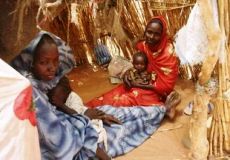AU/UN must be more active as Darfur deteriorates – ICG
November 25, 2007 (KHARTOUM) — The conflict in Sudan’s war-torn Darfur has changed radically and for the worse, a think tank warned on Monday, urging African and UN officials to devise a more proactive strategy to bring peace.
 “The Darfur conflict has changed radically in the past year and not for the better,” said the Brussels-based International Crisis Group (ICG) in a new report on Darfur, where conflict has raged for nearly five years.
“The Darfur conflict has changed radically in the past year and not for the better,” said the Brussels-based International Crisis Group (ICG) in a new report on Darfur, where conflict has raged for nearly five years.
“It has mutated, the parties have splintered and the confrontations have multiplied,” it said, even if there are many fewer deaths than in 2003-04.
“Violence is again increasing, access for humanitarian agencies is decreasing, international peacekeeping is not yet effective and a political settlement remains far off.
“The strategy the African Union/UN mediation has been following cannot cope with this new reality and needs to be revised,” said the report.
The ICG said that peace talks, which broke down rapidly in Libya last month, should be used to broaden participation — given that the most important rebel groups did not attend — and address all the conflict’s root causes.
The group said a joint AU-UN peacekeeping mission, scheduled to take over from 7,000 poorly equipped AU troops operating in an area the size of France since 2004, was unlikely to be fully operational until well into next year.
The Khartoum government insists that the joint force be largely African and has objected to Nepalese, Scandinavian and Thai soldiers amid US accusations that Sudan is dragging its feet to obstruct the force’s deployment.
“When it is on the ground, UNAMID must build upon lessons learned from its predecessor, including to be more pro-active in protecting civilians and responding to ceasefire violations,” it said.
“Its leadership should also engage actively in the peace talks so as to ensure coherence between what is agreed and its capabilities.
“The international community must give it more support than it did AMIS (African Union Mission in Sudan), including strong responses, with sanctions as necessary, to further non-compliance by any party, as well as to actions that obstruct the peace process or violate international humanitarian law.
Core issues such as land tenure and use, including grazing rights, and the role and reform of local government and administrative structures, must be negotiated if any final peace deal is to gain wide support, the report said.
The 2006 Darfur Peace Agreement — signed by the Sudanese government and only one major rebel group — was a “failure” said the ICG, charging that its limited number of signatories has hurt the peace process.
The Sudan Liberation Army/Movement of Minni Minawi, in particular, has been responsible for attacks on civilians, humanitarians, the AU mission and some of the violence in the internally displaced person (IDP) camps, the ICG said.
It accused Sudan’s main ruling party of wanting chaos in Darfur to hamstring opposition, of resettling key allies and defying the UN Security Council by absorbing Arab militias into security apparatus rather than disarming them.
The ICG said IDP camps, which house up to 2.2 million people, are increasingly violent, that Khartoum is trying to force people to return to unsafe areas and that the conflict has started to spill over to the oil rich Kordofan area.
(AFP)
